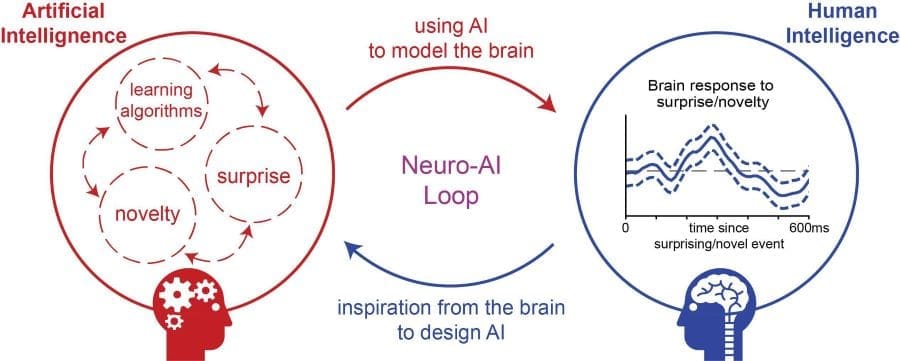In brief:
Surprises, whether pleasant or unsettling, play a fundamental role in shaping human behavior. From a film villain’s unexpected act of compassion to an election result that defies predictions, these moments provoke responses that blend thought and action. Researchers at EPFL’s Laboratory of Computational Neuroscience, led by Wulfram Gerstner, are working to unravel how the human brain processes these events and how they influence learning and decision-making.
Alireza Modirshanechi, now a postdoctoral researcher at Helmholtz Munich, Germany, developed a predictive algorithm during his doctoral work at EPFL to explore these questions.
Using artificial intelligence (AI), he created a model that replicates human responses to novelty and surprise, offering new insights into cognitive processes. This research, conducted at Gerstner’s lab, earned Modirshanechi the EPFL Dimitris N. Chorafas Foundation Award for 2024, recognizing its contributions to neuroscience and computational science.

Understanding surprise through mathematical definitions
A key challenge in Modirshanechi’s work was defining “surprise” in a way that could be translated into an intelligent agent designed to simulate human behavior. Drawing on established behavioral studies, he identified 18 mathematical definitions of surprise and novelty, programming these into the algorithm.
The definitions were tested using experiments in which participants encountered unexpected scenarios, such as sentences containing improbable words, sequences of sounds interrupted by anomalies, or outcomes that contradicted logical expectations.
The algorithm’s responses closely mirrored human behavior, offering a window into how people process surprising and novel events. By analyzing these results, Modirshanechi proposed a unified framework for comparing different approaches to quantifying surprise and explored its effects on the brain. His research distinguished between “surprise” as a factor that accelerates learning and “novelty” as a motivator for exploratory behavior.
“New things can be surprising, but they can also be expected,” Modirshanechi explains. “For example, seeing a solar eclipse for the first time is a new experience but it’s also an expected one, as you had heard about the eclipse in the news. On the other hand, if your mother who lives in another country suddenly knocks on your door, her visit wouldn’t be a new experience but it would be a surprising one. In our research, we quantified this mathematically and drew a distinction between surprise, which accelerates the learning process, and novelty, which drives exploration. We dissociated these signals in the brain.”
Testing predictions with human behavior
To validate the algorithm, Modirshanechi collaborated with EPFL’s Laboratory of Psychophysics, led by Michael Herzog, analyzing behavioral and EEG data from cognitive experiments. In scenarios characterized by volatile environments and sparse rewards, the algorithm successfully predicted 60% to 80% of participants’ decisions.
“Our goal isn’t to create an AI system that works better than humans, but rather to design one that’s more faithful to human behavior in order to improve our understanding of the brain,” Modirshanechi says. “Everyone knows that if you drop an apple, it’ll fall to the ground. But Newton found a mathematical formula to describe this process. That’s similar to what we’re trying to do – we’ve developed an algorithm that can predict when and by how much humans will be surprised, and we can explain the equation by which humans learn faster when they’re surprised.”
The algorithm also holds promise for studying neurological conditions such as schizophrenia, where individuals may perceive surprise differently. Modirshanechi highlights its potential to design experiments that explore how these differences affect learning and exploration, providing a quantitative foundation for such investigations.
Applications beyond neuroscience
The algorithm’s applications extend to fields beyond neuroscience.
In education, for instance, it could help optimize how surprise enhances learning and memory retention. Similarly, in AI, Modirshanechi’s work addresses a critical limitation: the reliance of most algorithms on stable environments.
“In the real world, things change constantly,” he explains. “Engineers need to be able to incorporate the ‘surprise’ factor into their models to make them more reliable and secure. I think the time is ripe to address that issue and develop the next generation of AI programs.”
By bridging neuroscience and computational science, Modirshanechi’s research offers a new perspective on the interplay between surprise, novelty, and human behavior. Its implications, from improving teaching methods to advancing AI, underscore the transformative potential of understanding the unexpected.
More information:
Modirshanechi, Alireza, ‘Seeking the new, learning from the unexpected: Computational models of surprise and novelty in the brain’, EPFL (2024). DOI: 10.5075/epfl-thesis-9716
Article Source:
Press Release/Material by EPFL
Featured image credit: vwalakte | Freepik




